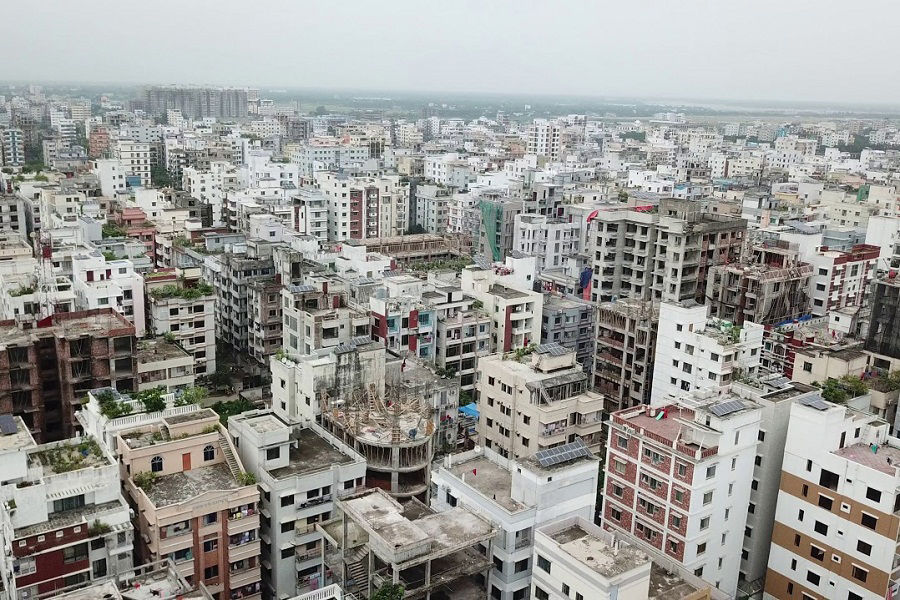
Published :
Updated :

Dhaka as a city is imploding. Overpopulation, civic amenities overburdened and only a limited mass transit system, traffic congestion, unregulated high-rises defying building codes, festering slums and finally insecurity have made this capital city a living hell. This cannot go on. The capital city has already earned the dubious distinction of being one of the world's least liveable cities, and if this situation continues, the consequences for its 20 million residents could be more severe in the coming days. The city's environment is already threatened, pollution will increase and water supply and sanitation facilities may collapse. Parks, fields, and open spaces have disappeared or are disappearing in most of the areas. Water bodies disappeared long ago. And now even the rivers and canals are decaying due to pollution and encroachment.
To save Dhaka from an impending disaster, a government task force recently suggested relocating the capital, arguing that the relocation is essential not only because Dhaka is no longer feasible to function as a capital, but also for the social, economic, and environmental survival of the city. The report, titled "Re-strategising the Economy and Mobilising Resources for Equitable and Sustainable Development," warns that without immediate action, Dhaka's function as a sustainable capital will continue to erode, posing a serious threat to national stability and growth.
Another recent report submitted by the Public Administration Reforms Commission (PARC) pointed to a practicable solution to Dhaka's problems. It has recommended that Bangladesh be turned into a provincial administrative system with capital Dhaka run under a Capital City Government like India's New Delhi, which is governed by the federal government. This proposal highlights that with the current form of governance it is becoming increasingly difficult to effectively deliver services due to the rapid growth of the population, particularly in Dhaka, and the unitary system of government.
It is true that every development plan has to contemplate a stable or foreseeable population. Otherwise who else can make a plan for a population that is continuously growing, a demographic base that is constantly shifting? Not only the jobless are migrating to Dhaka for supposed economic opportunity but the state structure is such that it would compel everyone to visit Dhaka for every purpose. All ministries, departments, state and private apparatuses are headquartered in Dhaka. This is due to the unitary structure of government. Can this not be altered? It is time for a drastic review.
Decentralisation and devolution of power are frequently discussed, but successive governments have been hesitant to grant greater independence and financial autonomy to local government bodies. If administrative power is decentralised and more opportunities are created outside Dhaka, the rate of migration to the city will come down, notably. Development will be more balanced and local leadership will have a greater chance to flourish.
Apart from the steady influx of people, the lack of coordination in governance is also responsible for the perpetual state of crisis in Dhaka. The bifurcation of the Dhaka City Corporation into Dhaka North and South in 2011 was effected in the face of opposition from various quarters, with the promise of improving governance and providing better civic services. That promise has not been fulfilled and neither of the two city corporations showed any improvement in performance. Even routine service entails bureaucratic complexity and delay, much to the sufferings of city-dwellers. Furthermore, as the two mayors of the city often held differing visions for their respective jurisdictions, it has led to policy mismatch and discord, which has negatively impacted the overall livability of the city.
The current system of governance also suffers from a significant lack of mayoral authority. One might recall here how former Dhaka North City Mayor Annisul Huq once lamented he had no authority to deal with 80 per cent of the problems facing the city dwellers. He said issues such as utility services, traffic jams, water-logging, enforcement of building codes and so on were not under the purview of city mayors. A mayor's primary responsibilities are to address the problems relating to parks, streetlights and waste management. That means the mayors lacked the authority to implement their voter-backed vision.
Over fifty independent organisations operating, having minimal coordination with the city corporations, handle essential services like water, roads, gas, disaster management, and others. This often leads to a lack of coordination, resulting in repetition of efforts and mismatch. For example, one organisation might dig a road for infrastructure work, only for another organisation to dig it up again shortly after, leading to unnecessary costs and significant inconvenience for residents. In such a scenario, even with the best intentions, the mayor may be unable to effectively address these issues due to the fragmented nature of service delivery. The mayors, even though they lack control over these agencies, have to shoulder the blame for failures beyond their remit.
Therefore, formation of a capital city government, where a single entity headed by an elected public representative will be responsible for the overall planning, coordination, and delivery of urban services, is more likely to succeed in improving the efficiency and effectiveness of urban governance. A unified city governance system is the key to coordinating all departments, facilitating integrated urban planning, aligning development goals, strategies, and actions, and ensuring effective policy implementation.
The civic blights are chronic and endless and cannot be remedied in one sweep. However, if the local government body is allowed to develop as an independent institution with greater financial and decision-making power, the mayor could act as a catalyst to bring about desirable improvements in civic services by coordinating the functions of all government bodies responsible for rendering different services. And in case things go wrong, the mayor would be compelled to take responsibility and act quickly - or face the wrath of voters.
aktuhin.fexpress@gmail.com


 For all latest news, follow The Financial Express Google News channel.
For all latest news, follow The Financial Express Google News channel.